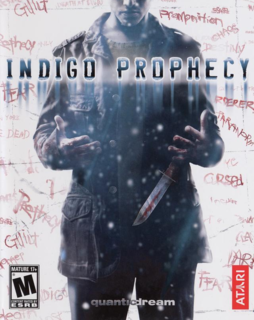Who says the adventure genre is dead?
It's a crazy start to an intriguing mystery, and the game never lets up. From then on, you control Kane, as well as two detectives investigating the murder. The interplay between the three characters is very well handled, and playing short sequences from all three perspectives really fleshes out the story.
The story is absolutely the best part about this game. From the instant it starts, you will be hooked. The mystery unravels perfectly as the story builds. Also, you get to have a hand in how the story plays out. You have lots of choices in this game. You can choose characters, what to say, where to go, how to tackle problems. It ends up feeling like a choose-your-own-adventure movie, which is awesome.
Lending to the movie-like atmosphere is the stellar sound and camera work. The music is very well done. It's sweepingly cinematic, hauntingly silent, or fittingly tense, depending on the situation. The voice work is also top-notch, which is absolutely essential in such a story-driven, cinematic game.
Similarly, the camera work is excellent. In action sequences, you control your character only by moving the analogue sticks in response to on-screen cues, or you rapidly alternate between pulling the triggers. This simplified control scheme allows the director a lot of control, which leads to some really awesome action scenes.
Indigo Prophecy has a couple of flaws, though. The first is its graphics. They are not too hot. It's most noticeable in the characters because you see them up close and all the time. That said, the cinematic flair of the game makes up for it, and I honestly don't think the graphics took away from the experience at all.
The second flaw is the control. When you're not in an action sequence, you directly control the character. The problem is, when you're running around, and the camera angle changes, the controls stay oriented to the old camera angle. In order to get the controls to work relative to the new camera angle, you have to bring your character to a complete stop before running again. This can be a minor annoyance, but since you are rarely in a time sensitive situation, it's never frustrating from a gameplay perspective.
The final flaw is the game's length. In general, I like short games, because I can beat them and move on to other games, so I rarely complain about a game being too short. Indeed, I think being short works to Prophecy's advantage because you can easily go back through, making different choices and seeing how the adventure plays out. So I guess I should clarify my complaint and say that the flaw is the end of the game's length. The story builds up brilliantly for about 8 hours, and then it seems like they just crammed the ending in.
The ending is, unfortunately, anticlimactic. It's not bad by any means, but everything before it is just so much better. For example, about an hour before the ending, you have an amazing, drawn out fight against the main antagonist. Unfortunately, when you face off against him at the very end, you defeat him in about a minute. There's also another party involved, but they're hastily introduced near the end, and then hastily dispensed with.
Nevertheless, this game is brilliant. The fantastic music, voice overs and direction lend the game a cinematic quality, and the choices you make within the jaw-dropping story make you feel as if you're experiencing a choose-your-own-adventure movie. Indigo Prophecy is a milestone in the seemingly dead adventure game genre, as well as a milestone in cinematic gaming and storytelling.

